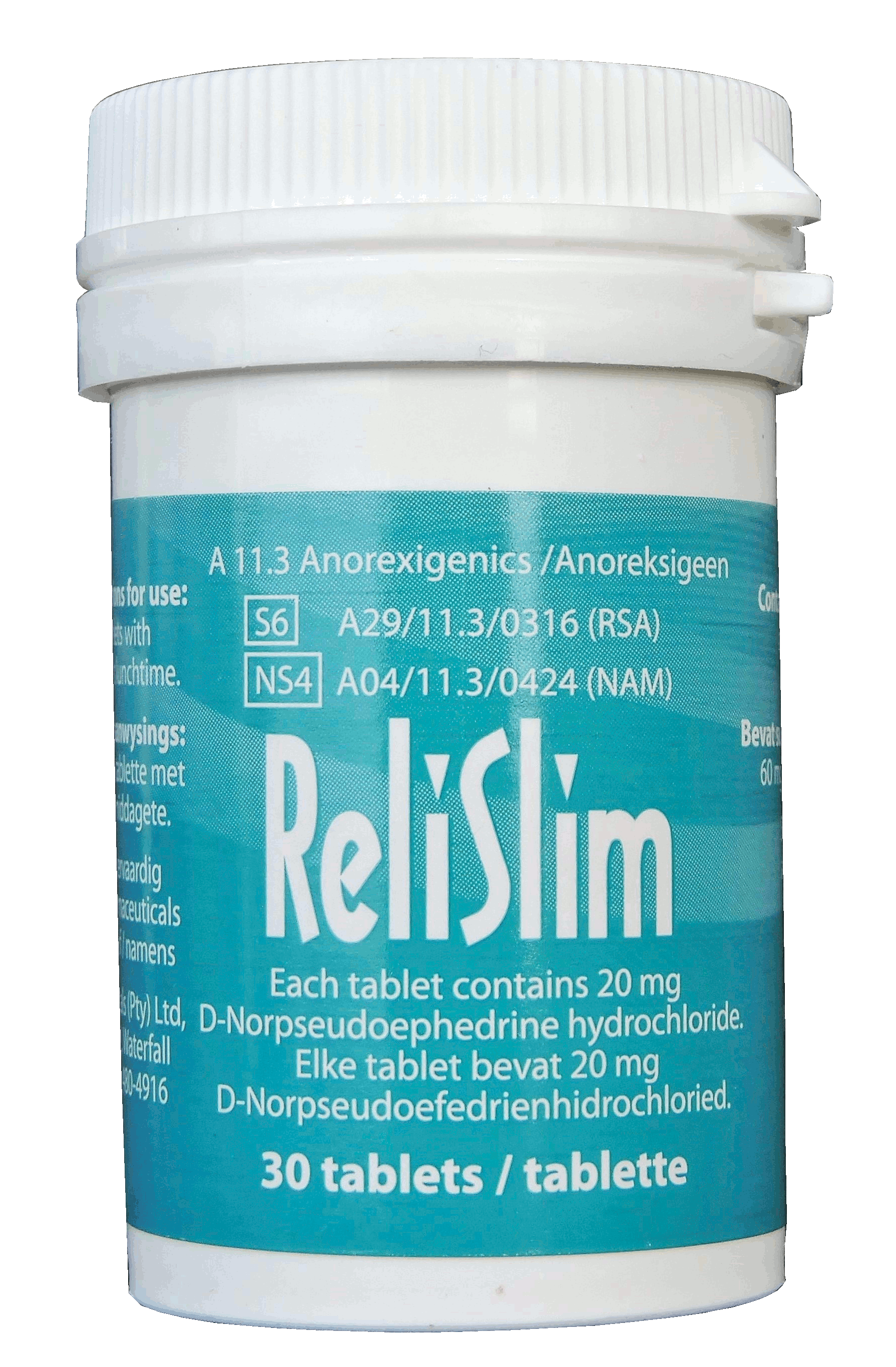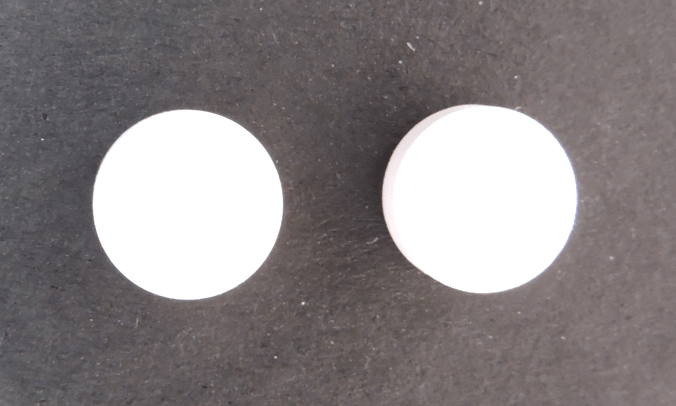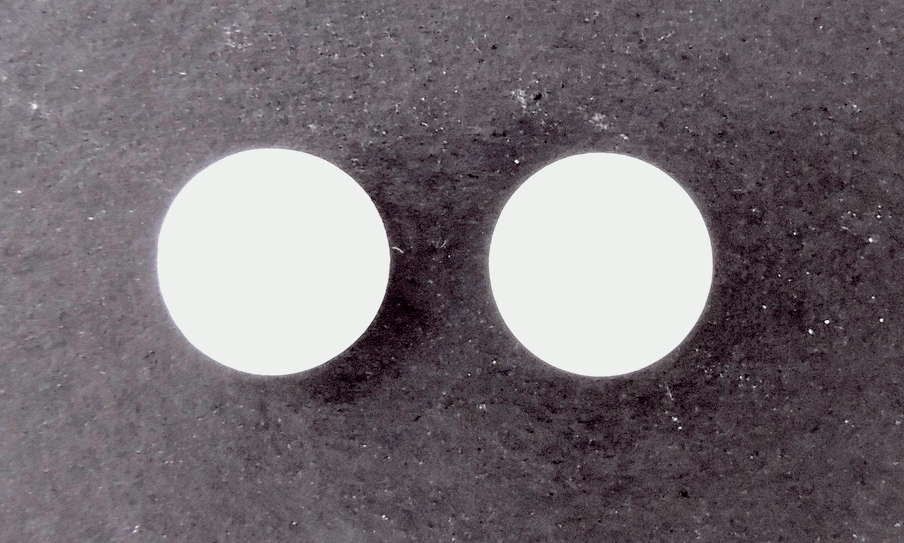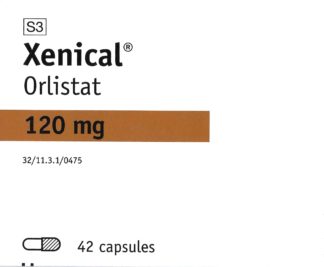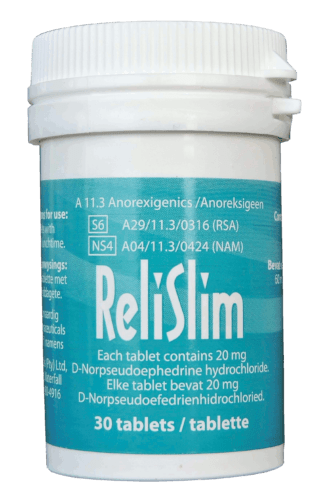Description
What Relislim is and what it is used for
Relislim is a sympathomimetic and has anorexigenic properties. Relislim promotes weight loss by suppressing appetite. An aid to mass reduction when used in combination with a reduced kilojoule intake.
What you need to know before you take Relislim
Do not take Relislim:
• If you are hypersensitive (allergic) to d-norpseudoephedrine hydrochloride or any of the other ingredients of Relislim.
• If you are pregnant.
• If you have coronary thrombosis (a blood clot inside blood vessels in your heart).
• If you have hyperthyroidism (an overactive thyroid).
• If you have closed-angle glaucoma (increased pressure in your eye).
• If you have severe hypertension (high blood pressure).
• If you have pheochromocytoma (cancer in your adrenal glands).
• If you are undergoing anaesthesia with cyclopropane, halothane or other volatile anaesthetics.
• If treated with monoamine oxidase inhibitors or within two weeks of stopping such treatment.
• If you are a young child.
Warnings and precautions
If you have a medical condition, seek advice from your health care provider.
Relislim should not be taken late afternoon, due to the stimulating effect which d-norpseudoephedrine has on the central nervous system. Relislim tablets are liable to be abused. Tell your doctor if you have a history of drug or alcohol abuse or have been diagnosed with a personality disorders. Tolerance with dependence has been reported. There is a lack of evidence for efficacy in long-term management of obesity.
Take special care with Relislim
If you have diabetes mellitus (you may be at higher risk of cardiac effects),
• If you have cardiovascular disorders (coronary insufficiency, ischaemic heart disease, cardiac dysrhythmias, obstructive cardiomyopathy, cardiac decompensation or anginal pain),
• If you have hypertension (blood pressure may be increased),
• If you have occlusive vascular disease (blockage or narrowing of an artery),
• If you have kidney impairment,
• If you have prostate disorders,
• If you have porphyria (you may be prescribed Relislim when no safer alternative is available),
• If you have a history of psychiatric illness,
• If you are an elderly patient (you may have a high incidence of atherosclerotic disease and may be at a higher risk of cardiac effects).
Children and adolescents
Young children should not take Relislim
Other medicines and Relislim
Always tell your health care provider if you are taking any other medicine. (This includes all complementary or traditional medicines.)
Tell your doctor if you are taking:
• Monoamine oxidase inhibitors (MAOI’s) (used to treat depression).
• Simpathomimetics, such as dexamphetamine, dopamine, dopexamine, ephedrine, isometheptene, mephentermine, metaraminol, methylphenidate, phenylephrine, phenylpropanolamine and pseudoephedrine.
• If you are planned to receive anaesthesia with chloroform, cyclopropane, halothane or other volatile anaesthetics.
• Digoxin (used to treat heart failure and a fast heartbeat).
• Quinidine or any other medicine used to treat heart rhythm disorders.
• Tricyclic antidepressants (used to treat depression or bedwetting in children).
• Any central nervous system stimulant medicines (used to enhance cognitive ability and in cold and flu medicines).
• Ergot alkaloids (used to treat migraine).
• Oxytocin (used during or to reduce bleeding after childbirth),
• Thyroid hormones.
• Medicine for high blood pressure or medicines that cause low blood pressure.
• Alpha blockers (used to treat high blood pressure or prostate problems).
• Non-selective beta-blockers (used to treat high blood pressure, heart problems or prevent migraine).
• Antiparkinsonian medicines, such as levodopa and bromocriptine.
• Medicines used for psychiatric or emotional conditions.
Relislim with food, drink and alcohol
Relislim must be taken with food. Do not take Relislim with alcohol.
Pregnancy, breastfeeding and fertility
If you are pregnant or breastfeeding, think you may be pregnant or are planning to have a baby, please consult your doctor, pharmacist or other health care provider for advice before taking this medicine. Safety during pregnancy and breastfeeding has not been established.
Driving and using machines
Relislim is unlikely to affect your ability to drive or operate machinery/equipment. It is not always possible to predict to what extent Relislim may interfere with your daily activities. Do not drive or operate machines until you know how Relislim affects you.
Relislim contains lactose monohydrate
If you have been told by your doctor that you have an intolerance to some sugars, contact your doctor before taking Relislim.
How to take Relislim
Do not share medicines prescribed for you with any other person. Always take Relislim exactly as your doctor or pharmacist has told you. Check with your doctor or pharmacist if you are not sure. Take one to two tablets with breakfast followed by one tablet at lunchtime, taken with a little water. Do not use for longer than 4 weeks at a time. If you have the impression that the effect of Relislim is too strong or too weak, tell your doctor or pharmacist.
If you take more Relislim than you should
In the event of overdosage, consult your doctor or pharmacist. If neither is available, contact the nearest hospital or poison control centre. Known symptoms of overdosage are insomnia, paranoid psychosis, delusions, hallucinations, precordial pain and tachycardia.
If you forget to take Relislim
Take your missed dose as soon as you remember, if within a few hours after missing a dose. If you only remember about the missed dose the following day, do not take a double dose to make up for the forgotten individual doses. In this case just continue taking one to two tablets with breakfast followed by one tablet at lunchtime, taken with a little water.
If you stop taking Relislim
If you have stopped taking Relislim for any reason, particularly because you think you are having side effects or for other illness, it is important that you contact your doctor before restarting.
Possible side effects
Relislim can have side effects. Not all side effects reported for Relislim are included in this leaflet. Should your general health worsen or if you experience any untoward effects while taking Relislim, please consult your health care provider for advice. If any of the following happens, stop taking Relislim and tell your doctor immediately or go to the casualty department at your nearest hospital.
- swelling of the hands, feet, ankles, facte, lips and mouth or throat, which may cause diffucilty in swallowing or breathing,
- rash or ithcing,
- fainting.
These are all very serious side effects. If you have them, you may have had a serious reaction to Relislim. You may need urgent medical attention or hospitalisation.
Tell your doctor immediately or go to the casualty department at your nearest hospital if you notice any of the following:
- changes in the way your heart beats (beating faster or slower),
- chest pain,
- irregular heart beats. These are all serious side effects. You may need urgent medical attention.
Tell your doctor if you notice any of the following:
Frequent side effects:
- feeling anxious or irritable, fear, confusion, psychotic reactions,
- restlessness, sleeplessness, headache,
- difficulty breathing,
- nausea (feeling sick), vomiting (being sick),
- weakness.
Less frequent side effects:
- tremors,
- impaired blood flow to the extremities, low blood pressure,
- dry mouth.
Side effects occurring with an unknown frequency:
- feeling dizzy,
- agitation, excitability,
- sweating,
- muscular weakness,
- difficulty urinating or emptying your bladder completely.
If you notice any side effects not mentioned in this leaflet, please inform your doctor or pharmacist.
How to store Relislim
• Store at or below 25 °C and protect from light.
• STORE ALL MEDICINES OUT OF REACH OF CHILDREN
• Do not use after the expiry date stated on the outer packaging
What Relislim contains
The active substance is d-norpseudoephedrine hydrochloride. The other ingredients are lactose monohydrate, microcrystalline cellulose and magnesium stearate.
What Relislim looks like
Relislim are small, round, white tablets. Available in securitainer bottles containing 30 and 90 tablets.

